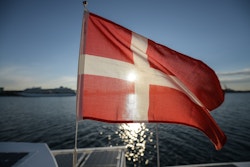Copenhagen, Denmark
Equipped with its new wind propulsion wings, she was able to reach a speed of more than 10 knots (twice its average electrical speed) for an energy saving of nearly 50%.
Coming from: Hamburg, Germany
Time of arrival: 12:00 PM

Energy Observer - Copenhagen
“Copenhagen’s stopover is important because it is a model city in terms of concrete initiatives for the ecological and energy transition. In addition, Denmark is a key player in the hydrogen revolution, which hosts the workshops of several leading manufacturers in the deployment of electrolysis solutions and decentralized and digitalized stations.”
A city in transition
In March 2017, the Danish government adopted a national action plan for the UN’s Sustainable Development Goals. The Danish capital has set itself the objective of carbon neutrality by 2025. To achieve its objectives, it has developed a whole network of green transport (natural gas buses, 400 km of cycle paths that even cover highways, taxes on vehicle purchases, etc.). It is also developing an education policy in which nature plays a predominant role (20% of nursery classes are located in the heart of the countryside).
A district of the city is also testing intelligent solutions (traffic light detection, connected bins, humidity sensors to rationalize the maintenance of green spaces…). Denmark began its energy transition in the 1980s. Today, nearly 50% of heating is produced from biomass (household waste). Tomorrow, about a hundred wind turbines should be built. A pilot hydrogen production project is still close to zero emissions. HyBalance, funded by the European Union, produces hydrogen on a large scale from wind turbines equipped with a hydroelectric power plant. In 10 years, CO2 emissions have dropped by 31%.
LaPee, female urinals go mobile
This is part of Energy Observer Solutions, the platform for pioneers committed to transforming the world. To learn more, please visit our dedicated website.
Discover Energy Observer SolutionsA Danish start-up has developed a device promoting the reappropriation of the public arena by the fairer sex. LaPee is the first urinal reserved solely for women.
All equal in cities?
Gender inequality has increasing resonance within the public debate. However, numerous sociologists believe that the public space itself serves as a breeding ground for this phenomenon. Though urinals have existed since ancient times, they are still largely designed for the male populations. However, the average time women have spent waiting to use public conveniences is actually nine times greater than that for men.
The Forest School

Learning from nature seams logical and essential. Sadly today, we are more disconnected from it than ever. In Denmark, the Danish have understood that it is vital to transform their education. Indeed, 37% of preschools are Forest Schools. On the menu of these wood schools, days out in the forest (whatever the month or the weather), discovering nature, handy work with saws and hammers and yoga classes. The best way to raise awareness as soon as possible. A great example that we should maybe follow?